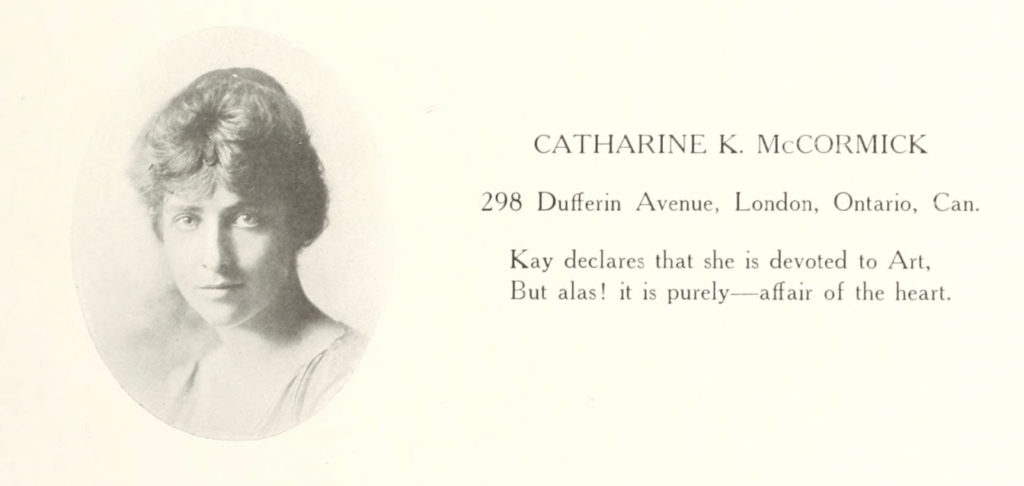Women’s History Month: 1918 Alum Instrumental in Ontario Community Theater Scene

In 1922, only four years after graduating from the Emerson College of Oratory, Catherine Keziah McCormick Brickenden ’18 was instrumental in the community theater scene in Ontario, Canada.
Brickenden died in 1993, and was posthumously honored in 2002, when the Brickenden Awards were created and named in her honor. The awards celebrated excellence in London, Ontario community theatre until 2022. The awards ceased to operate after COVID shuttered many community theater productions, reported the Londoner.
Community theater meant a lot to Brickenden:
“Outside of the very large cities, there is little left of the professional theatre, leaving only the thousand-foot reels of celluloid to unfold to us the dramatic genius of ancient and modern writers. And as one’s taste palls for canned food, so does a goodly section of the public long for a diet of fresh and living plays.”
Brickenden came to Emerson from Ontario, as Catharine Keziah McCormick, and many of her friends called her “Kizzie” throughout her life. Her grandfather was wealthy biscuit maker Thomas McCormick.
At Emerson she studied drama, literature, and playwriting. In 1918, she was the president of Emerson’s Canadian Club, and the organization presented her play Victoria Does Her Bit (A War Play Minus Sobs). McCormick played Col. Lewis, “whose bark is worse than his bite,” according to the playbill in the College’s 1918 yearbook. Only women were in the cast, so they performed the male character roles.
Her poem “Seniors” was reproduced in the 1918 yearbook:
When you’re writing out a “Blue Book”
These important facts you jot—
The Hist’ry of the play
And the Sources of the Plot.
You analyze the Time
Each character you spot
To do this with the Senior Class
Is part now, of my lot.
When we entered dear old E.C.O.
In year 1-9-1-4,
We were really more impossible
Than any fairy lore.
But now to look at us—
We are very wise—and more!
Such a class at Emerson
There never was before.
But attempting to describe
The bright futures of us all,
Would be a task the gravest
Of grave prophets to appall.
Some of our number may be stars
In limousines to loll;
And some in preparation school;
Keep guard along the hall.
Our talents are so numerous
No one could safely say
“So-and-so will do this or that,”
Or “She’ll go in such a way.
But there’s one thing we all want to do
And for that we’ll always pray
We’re coming back to E.C.O.
Some not far distant day.
After graduating, she made her way back to Canada, and was instrumental in forming the London Drama League in 1922. The amateur theater group produced mostly one-act plays in small halls, schools, and church basements, according to Brickenden.org. More community theater troupes formed in the next decade as the community
In 1934, the London Drama League joined together with three of those troupes — Half-Way House Players, The Meredith Players, and the Community Drama Guild — forming the London Little Theatre.
Through the years, Brickenden directed and wrote productions, including her original play, Pig in a Poke, in 1950, and Zanorin in 1957.
By the 1960s, the amateur theater was not as vibrant as prior decades, but she remained an artistic presence in London, wrote Christopher Doty, co-founder of the Brickenden Awards Committee.
At the first Brickenden Awards, her daughter, Dorinda Greenway, presented the first award for best actress, just as her mother had done at many award ceremonies in the 1940s, ’50s, and ’60s.
Categories